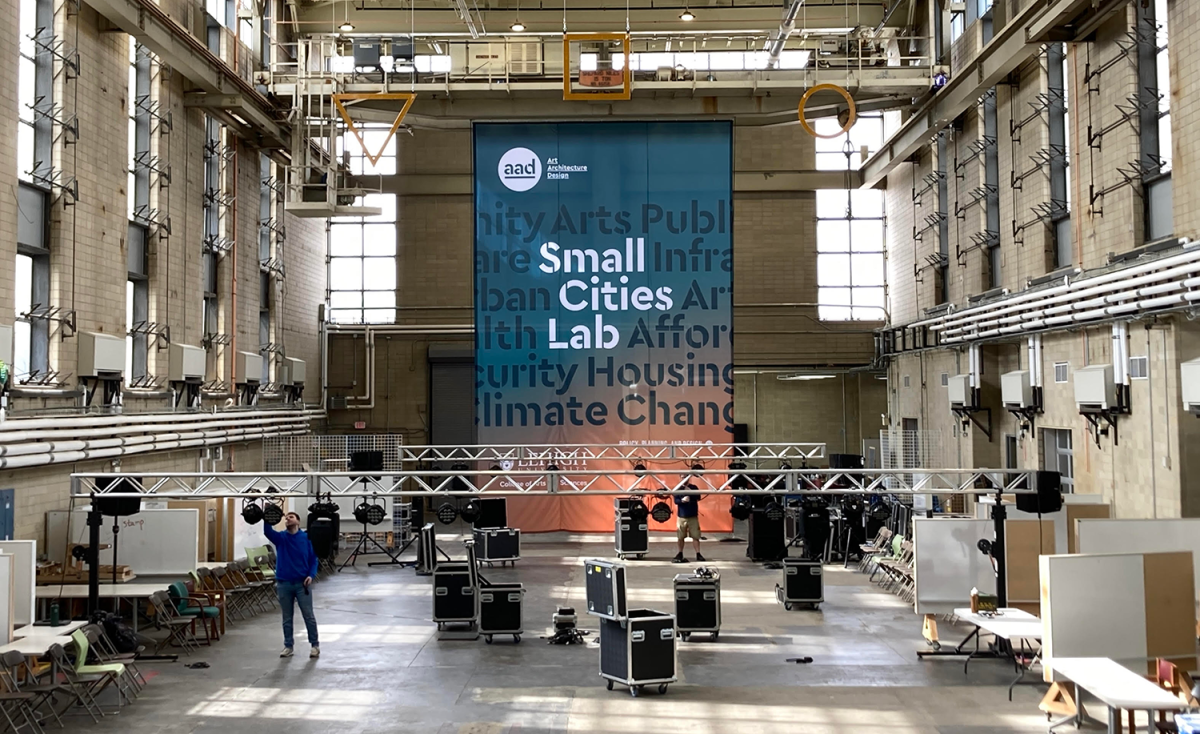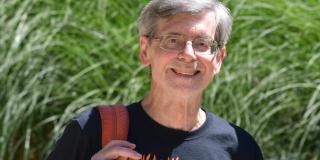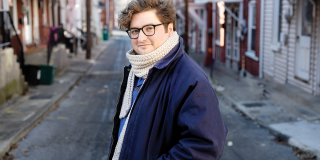
A new interdisciplinary project in the College of Arts and Sciences creates a home for community-facing, action-oriented urban research
A new initiative in Lehigh’s College of Arts and Sciences (CAS) is bringing together faculty and students from across the university to research and develop solutions to pressing challenges faced by small cities. Launched in January, the Small Cities Lab offers an interdisciplinary approach to place-based research and participatory design, tackling issues such as lack of affordable housing, urban ecology and greenspace, pollution, community health, food insecurity, and more in communities with less than 250,000 people.
The initiative, initially funded by CAS Dean Robert Flowers, has been championed by Wes Hiatt, an architect and assistant professor in the department of art, architecture and design, and Karen Beck Pooley, professor of practice in the political science department and director of the graduate program in environmental policy. The two are serving as the lab’s faculty co-directors. They proposed the project with support from Nicholas Sawicki, chair of the department of art, architecture and design, where the lab resides. A core group of 12 faculty representing multiple academic disciplines has been meeting to determine how the lab can grow and advance its work. The lab is thought to be the first of its kind at a U.S. university focusing exclusively on small cities.
“What we have realized in two years of preliminary research and discussion is that there is an incredible knowledge gap in the arena of small cities research, policy, planning and design,” Hiatt says.
Sawicki, whose department has provided administrative support for the project, adds, “Small cities are understudied in the research on urban issues and often don’t have tailored policy, planning and design research focused on the unique challenges and opportunities they face.”
While the 2022 U.S. Census reported that small cities were the fastest-growing in the country, researchers, policymakers, planners and designers have tended to focus on larger urban centers. While similar problems may occur in both large and small cities, a one-size-fits-all solution may not be appropriate.
Pooley, a city planner who has worked in New York City and Allentown, Pa., explains the dichotomy. “On their face, some of the challenges are the same: housing is too expensive for families to afford, or cities are grappling with vacant properties….The way in which those sorts of challenges function are slightly different in bigger and smaller places. The resources available are also very different. National advocacy organizations, foundations, or the federal government might be interested in piloting various programs in large urban areas to address these issues. Often those kinds of resources aren't available in a smaller place.”
Developing partnerships
The Small Cities Lab aims to address that resource gap. Hiatt explains that the lab will connect the expertise of faculty in multiple disciplines to address community challenges, through both fundamental and applied research. Faculty affiliated with the lab come from several academic departments in the College of Arts and Sciences, as well as from the College of Health, College of Business, and College of Engineering. Lehigh students will get hands-on experience implementing lab projects. The lab’s research and solutions will be grounded in the needs of the communities it serves, and developed in direct partnership with those communities.
“Part of our goal is to treat urban areas and urban issues, not as a monolith, but rather as having hyperlocal solutions to challenges that might be present everywhere but have different characteristics in all of these different kinds of cities,” Hiatt adds.
Many of the faculty involved in the lab’s launch already engage in research and projects addressing urban issues in small cities. Kate Jackson, assistant professor in the department of community and population health in the College of Health, is working with Bethlehem residents to address concerns about trash in the city. The project emerged after Jackson identified the need by listening to community members. “That’s what excites me about the lab: We’re all committed to having an equal process with our neighbors,” she says. When she recently learned that the size and unsightly appearance of trash cans were issues, she brainstormed with other faculty in the lab about designing a better receptacle.
The interdisciplinary nature of the lab also encourages faculty collaboration that will enhance research methodology. Chad Meyerhoefer, chair of the department of economics in the College of Business, has conducted economic research related to health access, nutrition, and food insecurity. He says the lab partnership offers a way to partner with colleagues to gain new insights.
“In economics, we tend to have a lot of expertise in data analysis and statistical modeling. But researchers in other disciplines such as sociology, political science, or environmental studies, may have expertise in qualitative modeling and qualitative data analysis. And that allows us to get answers to some questions that we can't do with just data.”
The lab supports two key initiatives outlined in Lehigh’s Strategic Plan. The first calls for a focus on developing nationally distinctive interdisciplinary research and academic inquiry. The second prioritizes enhancing the shared Bethlehem experience by fostering connections among Lehigh, the City of Bethlehem, the Lehigh Valley, and similar communities across the country.
Starting with alley houses
The first project launching under the lab’s umbrella is the Alley House program, which grew out of Hiatt’s research. Funded by two pivotal grants, a $196,722 federal Housing and Urban Development (HUD) Grant and an $850,000 federal appropriation through the Transportation, Housing, and Urban Development (THUD) bill, it proposes a solution to a scarcity of affordable houses in Bethlehem and the region. Alley houses are small houses built on land already occupied by a primary residence – usually in its backyard – and are a historic building type common in Bethlehem and other small cities. They are sometimes more generally known as accessory dwelling units or ADUs, facing alleyways instead of streets. In a city where there is little available land for building, the concept uses existing parcels.
Under a unique partnership between Lehigh, the City of Bethlehem, and Community Action Lehigh Valley (CALV), an anti-poverty organization that works to improve affordable housing and increase economic opportunity in the Lehigh Valley, a prototype for an affordable alley house in West Bethlehem will be built in 2024-25. The HUD grant is funding work Pooley and Hiatt are doing with the City of Bethlehem to identify how the city’s zoning code would need to change to accommodate alley houses.
Lehigh students have been involved with the Alley House program since 2023 when Hiatt and Pooley coordinated having students in their respective classes work on preliminary design and planning work for the project. Student involvement in the lab will continue in classes and in the form of research assistantships for Lehigh undergraduates. A $50,000 grant from the Baker Institute for Entrepreneurship will fund the first student research assistants to work under the auspices of the Small Cities Lab building the alley house prototype in summer 2024.
The Small Cities Lab will be located for the next three years in Building C on Lehigh’s Mountaintop Campus. There the campus community will watch the prototype for the Alley House Program and other research take shape. The space also will be used for meetings with community partners. “It’s an exciting space to be working in,” Hiatt says, noting that it will help to give the lab’s first project visibility. “The Alley House program is modeling exactly the kind of work the Small Cities Lab can do.”
The vision for the lab’s future work will be built on partnerships, drawing on faculty expertise and involving students to address small city issues. In the ideal scenario, small cities would seek out Lehigh’s expertise, as would faculty scholars at other universities, government, corporations, and industry partners.
“We hope to be thought of as a resource for partners locally, regionally, and even nationally,” Pooley says.
Story by Vicki Mayk
Image by Christine Kreschollek
Video by Douglas Benedict/Academic Image






